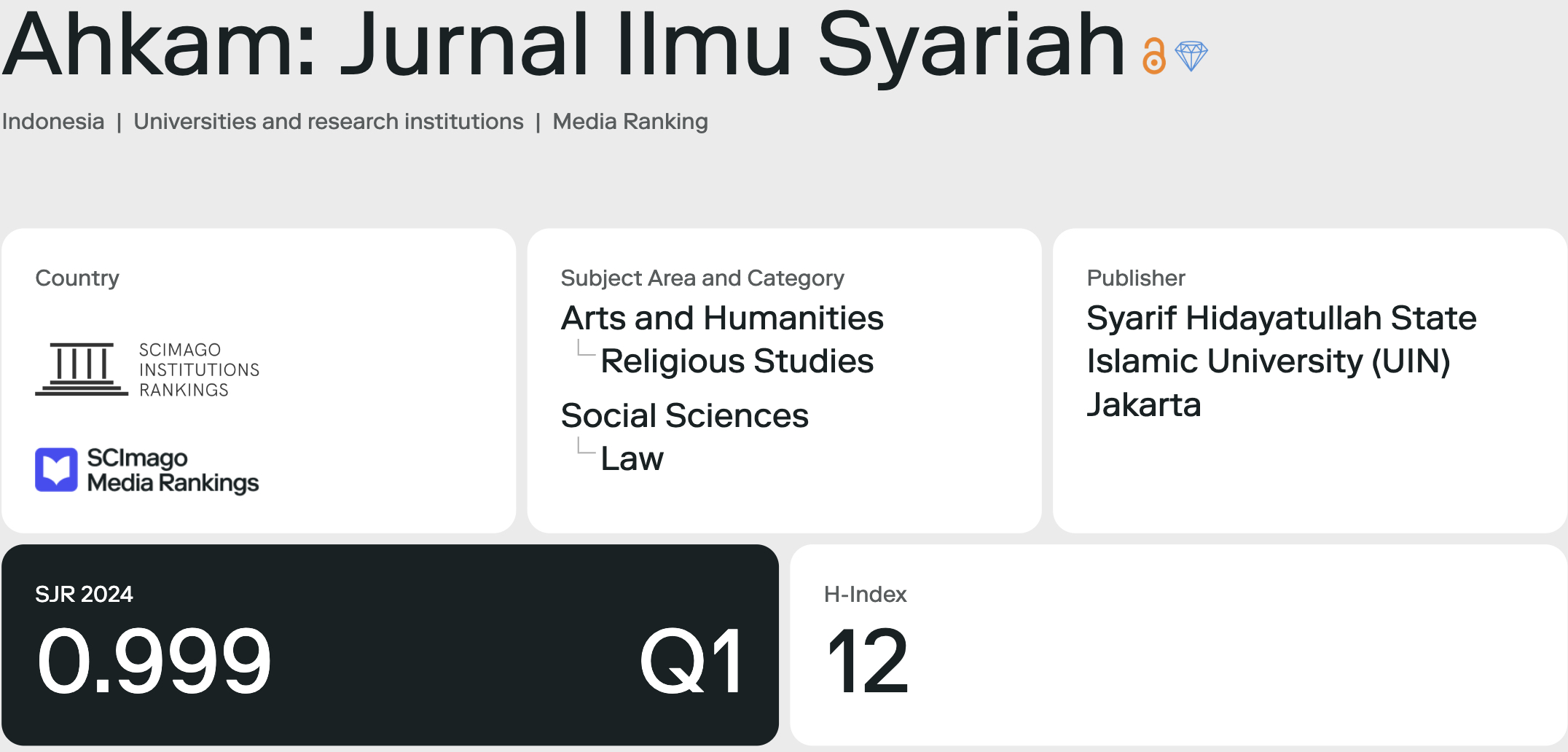THE STATE AS AN ESSENTIAL VALUE (ḌARŪRIYYĀT) OF THE MAQĀṢID AL-SHARĪ‘AH
DOI:
https://doi.org/10.15408/ajis.v19i1.6256Keywords:
The state, maqāṣid al-sharī‘ah, essential values, ḍarūriyyāt, maṣlaḥah.Abstract
Muslim scholars have mainly considered the maqāṣid al-sharī‘ah within three categories: ḍarūriyyāt (the essentials), ḥājiyyāt (the complementaries) and tahsīniyyāt (the desirables or the embellishments). The concept of maṣlaḥah is meant to protect the maqāṣid al-sharī‘ah (the higher objectives of sharī‘ah), which consist of seven essential values, namely religion, life, intellect, lineage, wealth, honour and state, all of which promote the people’s welfare and prevent all kind of evils. They are considered essentials because neglecting them would cause total social disruption and anarchy. Even though classical scholars considered the darūriyyāt to be six in number, this article suggests that the value of “state” be added to this list. The values in the darūriyyāt category must be upheld and protected from any real or unexpected threats either by maintaining the essentials or removing the disruption. The concept of state is just as essential as the other six values, for without it, all of them would be endangered and considered incomplete. Therefore, the “state” value guarantees the continued existence of other values. In this paper, the author argues that this value should be regarded as a seventh essential value.
Para cendekiawan Muslim telah mempertimbangkan maqāṣid al-sharī‘ah dalam tiga kategori: ūarūriyyāt (esensi), ḥājiyyāt (pelengkap) dan tahsīniyyāt (keinginan atau hiasan). Konsep maṣlaḥat dimaksudkan untuk melindungi maqāṣid al-sharī'ah (tujuan yang lebih tinggi dari syariat), yang terdiri dari tujuh nilai esensial, yaitu agama, kehidupan, kecerdasan, garis keturunan, kekayaan, kehormatan dan negara. Semuanya bermaksud kesejahteraan rakyat dan mencegah semua jenis kejahatan. Mengabaikan hal itu akan menyebabkan gangguan sosial dan anarki total. Meskipun para sarjana klasik menganggap darūriyyāt berjumlah enam, penelitian ini menunjukkan bahwa nilai "negara" ditambahkan ke daftar ini. Nilai-nilai dalam kategori itu harus dijunjung tinggi dan dilindungi dari ancaman nyata atau tidak terduga, baik dengan mempertahankan esensi atau menghilangkan gangguan. Konsep negara sama pentingnya dengan enam nilai lainnya, karena tanpa itu, semuanya akan terancam dan dianggap tidak lengkap. Oleh karena itu, nilai “negara” menjamin keberlanjutan keberadaan nilai-nilai lain. Peneliti berpendapat bahwa nilai ini harus dianggap sebagai nilai esensial ketujuh.
References
Abū Sulaymān, ‘Abd al-Raḥmān Ibrahīm. “Al-Fiqh al-Usūlī” (Jaddah, Dār al-Shurūq, nd.)
Asad, Muhammad. “The Principles of State and Government in Islam,” (Great Britan: Dar al-Andalus, 1981)
Âshûr, Muḥammad Ṭâhir Ibn (d.1973), “Maqâsid alSyarî‘ah al-Islâmîyyah” (İslam Hukuk Felsefesi, Gaye Problemi), tr. Vecdi Akyüz and Mehmet Erdoğan (İstanbul: Ra‘bet, 1999)
- “Maqâshid al-Sharî’ah al-Islâmîyyah”, Tunis: 1946.
Būṭī, Muḥammad Sa‘īd Ramaḍan. “Jihad in Islam, How to Understand & Practice it,” translated by Munzer Adel Absi, (Damascus: Dār al-Fikr, 1995)
Hikmatiar, E. (2018). Nafkah Iddah Pada Perkara Cerai Gugat. Mizan: Journal of Islamic Law, 4(1).
Ghazālī, Abu Ḥāmid Muḥammad ibn Muḥammad (d. 505/1111), “Al-Mustaṣfā’ min ‘Ilm al-Uṣūl”, Al-Maktabah al-Tijāriyyah Cairo 1356/1937.
Ibn Farḥūn, “Tabṣīrāt al-Ḥukkām fī Uṣūl al-‘Aqlīyah wa Manāhij,” (Cairo: Maktabat al-Kulliyat al-Azhariyah, 1986).
Ibn Khaldūn, ‘Abd al-Raḥmān. “Muqaddimah” (Beirut: Dār al-Kitāb al-Lubnānī, nd.)
Ibn al-Muqaffā’, ‘Abd Allah. (d.137/756), “Risālah fi al-Ṣaḥābah,” ed. Muḥammad Kurd ‘Alī, 4th edition (Cairo: Risālah Bulagh, 1954)
Ibn Qayyīm al- Jawzīyyah, “Al-Ṭuruq al-Ḥukmiyyah fī al-Siyāsah al-Sharī‘ah” (Cairo: al-Mu’assisah al-‘Arabiyyah li al- Ṭibā‘ah, 1380/1961)
Ibn Qudāmah, Abū Muḥammad Muwaffiq Al-Dīn Al-Maqdisī. (d. 620/1223), “Al-Mughnī, al-Nūr al-Islāmiyyah”, Cairo.
Ibn Taymīyyah, Al-Siyāsah al-Shar‘īyyah (Cairo: Dār al-Fikr, n.d.), pp. 150-151.
Iṣlāhī, ‘Abdul Azīm. “Works on Market Supervision and Sharī‘ah Governance (Al-Ḥisbah wa al-Siyāsah al- Sharī‘ah) by the Sixteenth-Century Scholars,” Quarterly Journal of the Pakistan Historical Society, vol. 54, no. 3 (2008), p. 7-20.
- Economic Concepts of Ibn Taimīyah, (Leicester: The Islamic Foundation, 1988).
Jaṣṣāṣ, Abū Bakr Aḥmad b. ‘Ali al-Rāzi. (d.370/981), “Al-Fuṣūl fī al-Uṣūl,” ed. Ājil Jasīm an-Nashmī (Kuwait: Wizārāt al-Awqāf wa al-Shu’ūn al-Islāmiyyah, 1988)
Kamali, Muḥammad Hāshim. “Principles of Islamic Jurisprudence,” (Cambridge: Islamic Text Society, 1997)
- Siyāsah Sharī‘ah or the Policies of Islamic Government, The American Journal of Islamic Social Sciences, vol.6, no.1, 1998.
- Al-Maqāṣid al-Sharī‘ah Made Simple, (Washington: IIIT, 2008)
Kayadibi, Saim. Istiḥsān: The Doctrine of Juristic Preference in Islamic Law (Kuala Lumpur: Islamic Book Trust, 2010)
- The Theory of Syarî’ah Oriented Public Policy. Ahkam, XV (2), 2015. pp. 171-180.
Khallāf, ‘Abd al-Wahhāb. Al-Siyāsah al-Shar‘iyyah (Cairo: al-Maktabah al-Salafīyyah, 1931).
Mawārdī, Abūl Ḥasan al Shāfi‘ī. (450/1058), “Kitāb al-Aḥkām al-Sulṭāniyyah,” (Cairo: Dar al-Hadith, 2006)
- “The Ordinances of Government,” translated by Asadullah Yate, (London: Ta-Ha publishers, nd.)
Mutawallī, Abd al-Ḥamīd. “Mabādī’ Niẓām al-Ḥukm fī al-Islām” (Alexandria: Mansha’ah al-Ma‘ārif, 1974).
Muwaffaq bin Aḥmad Makkī (d.568/1172), “Manāqib al-Abu Ḥanīfah” (Beirut: np., 1981)
Qarāfī, Shihāb al-Dīn al-Mālikī. (d. 684/1285), Al-Iḥkām fī Tamyīz al-Fatāwī ‘anil-Aḥkām wa Taṣarrufāt al-Qāḍī wa al-Imām, (Aleppo: Dār al-Bashāir al-Islāmiyyah, 2009)
- “Kitāb Anwār al-Burūq fī Anwār al-Furūq” (Beirut: Dār al-Ma‘rifah, nd.)
Qāsimī’, Ẓafīr. “Niẓām al-Ḥukm fī al-Sharī‘ah wa al-Tārīkh al-Islāmī” (Beirut: Dār al-Nafā’is, 1990).
Raysūnī, Aḥmad. “Imām al-Shāṭibī’s Theory of the Higher Objectives and Intents of Islamic Law” (Selangor: Islamic Book Trust, 2006).
Rosenthal, Erwin I. J. Political Thought in Medieval Islam (Cambridge: Cambridge University Press, 1962)
Sarakhsī, Muḥammad bin Aḥmad bin Sahl Abū Bakr Shams al-Aimmah al-Ḥanafī. (d. 483/1090), “Kitāb al-Mabsūṭ”, Beirut. 2nd etd.
Shāṭibī, Abū Ishāq Ibrāhīm bin Mūsa Al-Ghirnāṭī (d. 790/1388), “Al-Muwāfaqāt fī-Uṣūl al-Sharī‘ah”, translated into Turkish “İslami ilimler metodolojisi” by Mehmet Erdoğan, İz yayıncılık, İstanbul 1999.
- “Al-Muwāfaqāt fī-Uṣūl al-Sharī‘ah”, Ed. ‘Abd-Allah Diraz. Dār al-Ma‘rifah, Beirut. 1997.
Tāj, ‘Abd al-Raḥmān. Al-Siyāsah al-Shar‘iyyah wa al-Fiqh al-Islāmī (Cairo: Maṭba‘ah Dār al-Ta’līf, 1373/1953).
Zaydān, ‘Abd al-Karīm, “Al-Wajīz fī Uşūl al-Fiqh”, (Baghdād: Maktabah al-Quds, 1976).
Zuhaylī, Wahbah. “Al-Dharā‘ī’ fī al-Siyāsah al-Shar‘iyyah wa al-Fiqh al-Islāmī” (Dimashq: Dār al-Maktabī, 1999).








